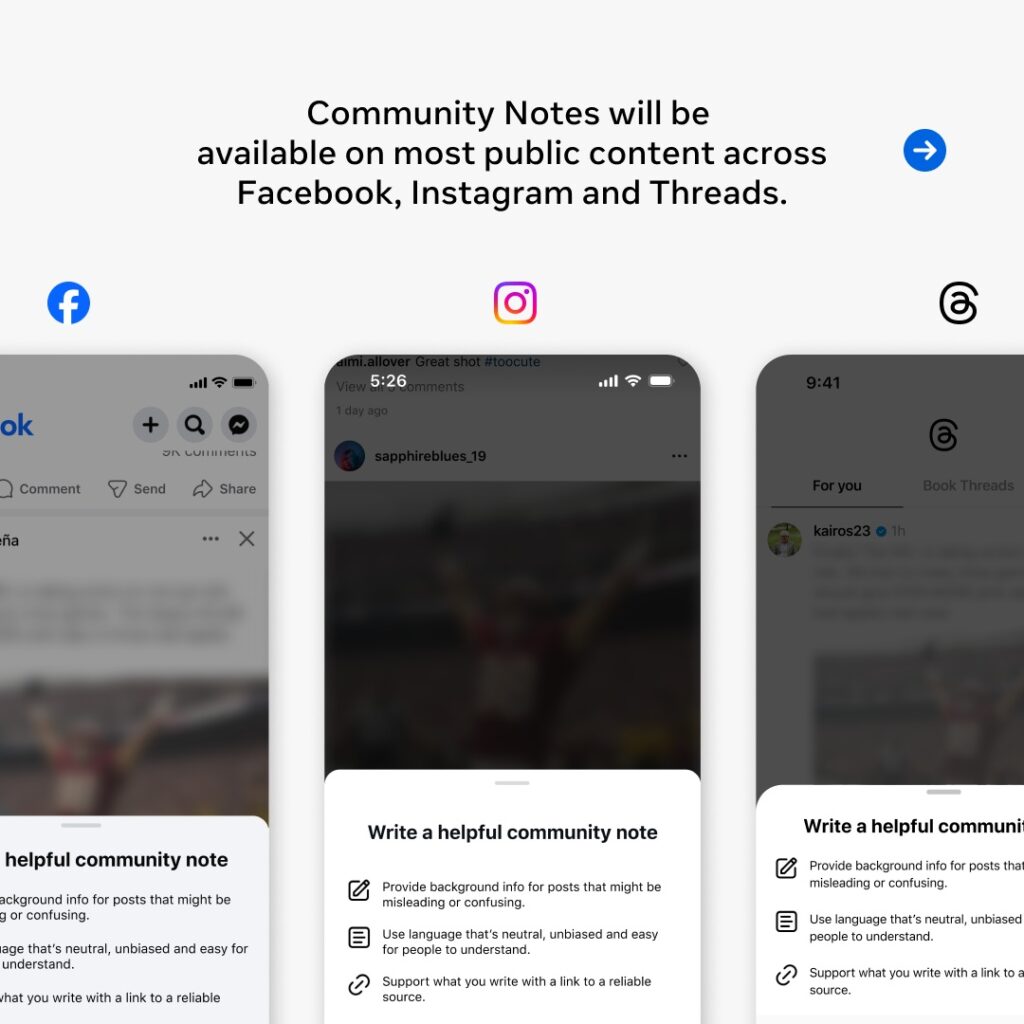Meta’s shift from third-party fact-checking to a Community Notes model represents a major change in how misinformation is handled across Facebook, Instagram, and Threads. While this move is positioned as a step toward greater transparency and community-driven moderation, it raises significant concerns, not just for individual users, but for brands and advertisers as well.
With Meta’s platforms reaching over 3.3 billion people, the effectiveness (or failure) of this new system could have direct consequences for businesses. From brand safety risks to misinformation-fuelled crises, here’s how brands should prepare for the impact of these changes.
1. Increased Brand Safety Risks
One of the biggest concerns for brands is content moderation becoming less reliable. Previously, Meta relied on third-party fact-checkers to identify and limit the spread of misinformation. Now, this responsibility falls to Community Notes contributors, everyday users who may not always provide fact-based, unbiased assessments.
For brands, this could mean:
- Misinformation spreading unchecked, potentially impacting industries like healthcare, finance, and politics.
- Brand-related falsehoods gaining traction if misleading content about a company or its products is not fact-checked effectively.
- Association with harmful content, as brands advertising on Meta’s platforms could unknowingly appear alongside misinformation or controversial posts.
Without professional oversight, there is a higher risk of misinformation slipping through the cracks, making brand reputation management more challenging.
2. Harder to Correct False or Misleading Brand Mentions
Under the old system, brands could work with Meta and fact-checkers to flag and correct false claims about their business. Now, with Community Notes requiring cross-ideological agreement, it may be significantly harder to get misleading posts corrected or labelled.
A key issue is that Community Notes may never be displayed if contributors with differing views cannot agree. Research on X’s version of Community Notes found that 73% of fact-checking notes on political topics were never published. If the same trend continues on Meta, brands could struggle to combat misleading narratives, competitor-driven disinformation, or viral hoaxes.
3. A Shift in Crisis Management Strategy
With unreliable fact-checking, brands need to take a more proactive role in protecting their reputation. Businesses can no longer rely on Meta’s moderation to flag or remove harmful content. Instead, brands should:
- Monitor social conversations more closely using social listening tools.
- Respond quickly to viral misinformation before it spreads too widely.
- Build relationships with credible media outlets to provide official statements and corrections.
Brands must assume greater responsibility for managing their own narratives, rather than depending on platform moderation to do it for them.
4. Potential for Organised Manipulation Against Brands
One of the biggest weaknesses of X’s Community Notes system has been manipulation by organised groups, and there is little reason to believe that Meta will be immune. If coordinated groups work to suppress or promote misleading content, brands could find themselves targeted by false claims, with no reliable way to correct them.
For instance:
- Competitors or activist groups could spread misleading information about a brand’s practices.
- Bad actors could organise to block accurate corrections by preventing consensus on Community Notes.
- Brands could face reputational damage if their own content is flagged for misinformation, even if the claims are false.
The potential for weaponised misinformation is a serious risk, particularly for brands in highly scrutinised industries like healthcare, sustainability, and tech.
5. Uncertainty Around Advertising and Content Visibility
Meta has confirmed that Community Notes will not apply to ads, but misinformation around brands can still spread through organic content. If misleading posts about a brand gain traction, it could negatively impact consumer trust, sales, and overall brand perception.
Additionally, Meta has not fully clarified whether Community Notes will impact content ranking. If posts flagged by Community Notes contributors receive lower reach, brands may need to adjust their organic content strategy to ensure visibility.
How Brands Should Respond
With Meta’s moderation becoming less reliable, brands must take a more proactive approach to safeguarding their reputation, upgrading standard crisis comms procedures:
1. Investing in Social Listening and Rapid Response
Brands should track mentions in real-time to identify and address misinformation before it escalates. Tools like Brandwatch, Sprinklr, or Meltwater can help detect emerging issues.
2. Educate Consumers with Verified Information
Use owned media channels, company websites, blogs, and official social pages, to provide factual content and counter misinformation.
3. Build Stronger Relationships with Influencers and Media
Work with trusted industry experts, influencers, and journalists who can provide credible third-party validation when false claims emerge.
4. Prepare for Crisis Scenarios
Develop a crisis communication plan that includes:
- Pre-approved messaging for misinformation response.
- Designated spokespersons who can address issues quickly.
- A structured response protocol for engaging with Meta when necessary.
Meta’s decision to replace fact-checking with Community Notes shifts the responsibility of misinformation control from professionals to users with unknown biases. While this aligns with a more open, free-speech approach, it also creates significant risks for brands, from reputation threats to crisis mismanagement.
Businesses need to adjust their strategies now to mitigate these risks. By monitoring conversations closely, investing in proactive communication, and building credibility through trusted sources, brands can navigate the changing landscape and maintain consumer trust, regardless of Meta’s evolving moderation policies.




RECOMMENDED FOR YOU
Meta Taps Publishers to Power AI Outputs
Meta has re-entered the news licensing space with a…
Meta has re-entered the news licensing space with a…
Meta Launches AI Support Hub on Facebook and Instagram
Managing account issues on Facebook and Instagram has long…
Managing account issues on Facebook and Instagram has long…
Meta Adds New AI Tools To Supercharge Lead Gen
Meta is rolling out a wave of updates to…
Meta is rolling out a wave of updates to…